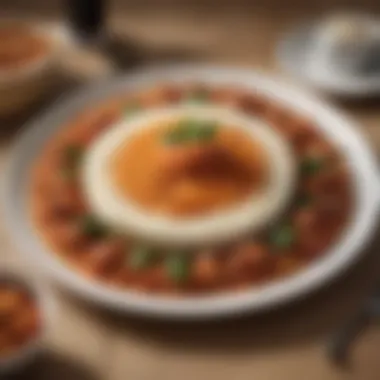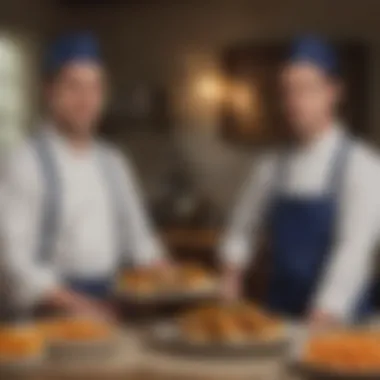Exploring the Culinary Legacy of the Fox Brothers


Intro
The culinary world is often shaped by individuals whose influence transcends mere recipes and cooking techniques. The Fox Brothers, though not widely recognized in mainstream culinary narratives, have left an indelible mark on gastronomy through their innovative approaches and unique recipes. Understanding their contributions allows us to appreciate not only their dishes but also how they have shaped the way we think about cooking today.
This article will delve into the multifaceted legacy of the Fox Brothers, offering insights into their historical context and cultural significance. We will explore their remarkable recipes, foundational techniques, and how these elements inspired new generations of chefs. Insights into their culinary philosophy will be fundamental, showcasing their approach to blending tradition with innovation.
By examining the Fox Brothers’ contributions, readers will gain a deeper appreciation for the culinary arts and the ongoing evolution of gastronomy. Let's embark on this journey of culinary exploration.
The Historical Context of the Fox Brothers
Understanding the historical context of the Fox Brothers sheds light on their culinary journey and achievements. It helps to frame their impact on gastronomy and the evolution of cooking techniques. The Fox Brothers emerged during a time when cooking was beginning to see shifts towards more refined and innovative approaches. This period experienced a blend of traditional practices and emerging trends that shaped their culinary legacy.
Origin of the Fox Brothers
The Fox Brothers, hailing from a lineage of cooks and enthusiasts, had their roots deeply embedded in culinary traditions. Born into a family that valued food’s cultural significance, they learned foundational skills early. The brothers were influenced by their environment, which was rich with local ingredients and cooking practices specific to their region.
Their early life marked a curiosity for taste and method that would later define their careers. The importance of family gatherings around the table framed their initial perspectives on food. The notion of shared meals and community engagement in cooking was prevalent.
Furthermore, each brother brought a unique flavor to the culinary scene. By synthesizing their backgrounds and newly acquired knowledge, they eventually carved out a distinct identity in the culinary arts. Their journey was not just personal but reflected broader societal trends in cooking that sought to balance heritage and innovation.
Culinary Environment of Their Era
The culinary environment in which the Fox Brothers operated was marked by notable transitions. The late 19th and early 20th centuries saw a gradual shift from local, home-style cooking to a more sophisticated and experimental approach in culinary arts. This evolution was spurred by both technological advances and globalization, which introduced chefs to varied flavors and techniques from around the world.
During this time, key influences included:
- Emergence of Professional Kitchens: A more structured and professional food service environment began to form. Culinary schools also emerged, fostering new talent and concepts.
- Increased Access to Ingredients: Railways and other transport innovations allowed for a wider distribution of fresh produce and exotic spices, broadening the culinary landscape.
- Culinary Literature and Artistry: Publication of cookbooks and food magazines encouraged experimentation among chefs. Literature from celebrated chefs began to influence cooking styles, emphasizing presentation and flavor.
This environment presented challenges and opportunities for the Fox Brothers, who embraced these elements to refine their skills. They did not shy away from integrating international flavors while maintaining their local traditions. Through this adaptability and openness, they contributed to the evolving narrative of culinary arts, leaving a prominent mark that resonates to this day.
"The legacy of the Fox Brothers is not just what they cooked, but how they approached food—through the lens of culture, collaboration, and continuous evolution."
The Culinary Philosophy of the Fox Brothers
The culinary philosophy of the Fox Brothers is essential in understanding their lasting impact on the culinary world. Their approach to cooking reflects a blend of cultural respect, craftsmanship, and sustainable practices. This philosophy sets the foundation for their signature techniques and recipes. It not only shaped the way food is prepared and presented but also fostered a deeper appreciation for the ingredients used.
The Fox Brothers believed in cooking as an art and a science. This duality informed their methods, resulting in dishes that are both flavorful and visually appealing. By examining their core principles and commitment to sourcing quality ingredients, one can grasp how they navigated changing tastes while remaining true to their values.
Core Principles of Their Cooking
The cooking style of the Fox Brothers is rooted in several core principles that guide their culinary creations. These principles include:
- Respect for Ingredients: They emphasized using high-quality, fresh ingredients. This respect extended to understanding the origin of each component, which added depth to their dishes.
- Simplicity with Purpose: Rather than overcomplicating recipes, the Fox Brothers prioritized simplicity. Each flavor had a purpose and contributed to the overall harmony of the dish.
- Culinary Innovation: They were not afraid to experiment. Their willingness to push boundaries without losing sight of traditional techniques allowed them to create unique fusion dishes that captivated taste buds.
- Seasonality: Adapting menus based on seasonal produce was a core tenet. This practice ensured flavors were at their peak and allowed for a dynamic dining experience.
Each of these principles demonstrates not only their technical skills but also their deep connection to culinary traditions and the natural world.
Sourcing Ingredients: A Commitment to Quality
The Fox Brothers’ commitment to sourcing ingredients speaks to their integrity as chefs. They understood that great cooking begins with great ingredients. This idea is foundational in their culinary philosophy. They were meticulous in their sourcing, often developing relationships with local farmers and suppliers. This direct connection ensured that the ingredients were not only fresh but also ethically produced.
The importance of their sourcing practices includes:
- Supporting Local Economies: By buying locally, they helped strengthen community bonds and support sustainable agricultural practices.
- Quality Over Quantity: They focused on high-quality ingredients that could enhance the flavor and quality of their dishes, often preferring smaller batches of premium produce.
- Transparency in Sourcing: They valued transparency, which meant knowing where their food came from and how it was grown or raised. This knowledge informed their decisions and enhanced their culinary creations.
"Cooking with a clear conscience and a deep respect for the source transforms a meal into an experience."
The Fox Brothers’ sourcing methods highlight how attention to detail in ingredient selection is crucial for any chef. Through their philosophy, they not only crafted exquisite culinary experiences but also set a precedent for future chefs to follow.
Innovations and Techniques Introduced
The legacy of the Fox Brothers is encapsulated not only in their culinary philosophy but also in the innovations and techniques they introduced. Understanding their contributions is essential for those passionate about gastronomy. The methods they developed have had a lasting impact on how modern chefs approach cooking, making it crucial to explore the nuances of their signature techniques and the broader effects they have had on contemporary culinary practices.
Signature Techniques and Methods
The Fox Brothers’ kitchen was a laboratory of sorts, where classical techniques met creativity. They embraced precision in culinary methods, emphasizing proper knife skills and cooking times. One technique that stands out is their approach to sous-vide cooking. By using this method, they ensured that proteins were cooked evenly, enhancing flavors and tenderness. This technique allows for meticulous temperature control, which was revolutionary during their time.
Another significant method was their training in flavor layering. The Fox Brothers understood that the balance of flavors could elevate a dish. They utilized base stocks to build flavor profiles, a practice that modern chefs still adhere to. Their emphasis on seasoning, from the use of herbs to the judicious application of salt, created dishes that were bold yet refined. The attention they paid to each element of a dish has inspired chefs to rethink ingredient combinations, encouraging experimentation while respecting traditional flavors.
"The pursuit of perfection in technique opens doors for culinary creativity."
Impact on Modern Culinary Techniques
The influence of the Fox Brothers on modern culinary practices is profound and multifaceted. Their signature techniques have paved the way for what is now standard in fine dining. The integration of sous-vide and precision cooking can be traced back to their experimentation. Today, chefs around the world employ these strategies, reflecting the advancements in culinary science they championed.
Furthermore, the Fox Brothers’ commitment to sourcing local and sustainable ingredients has reshaped culinary ethics. As awareness of environmental concerns grows, their philosophies regarding ingredient quality remain relevant. Today’s chefs feel a burgeoning responsibility not only to create exceptional dishes but also to consider the sourcing and impact of their culinary choices.
Their methods have also encouraged a sense of community within the culinary world. Chefs are now more inclined to share techniques and ideas, creating a network that echoes the collaborative spirit the Fox Brothers embodied. The evolution of gastronomy is, in many ways, a testament to their innovative spirit and willingness to adapt.
The ability to transcend tradition while maintaining respect for it remains vital. The Fox Brothers taught that culinary arts should evolve without losing sight of foundational principles. This integration fortifies their legacy, influencing generations of chefs to strive for excellence while embracing innovation in their craft.
Iconic Recipes of the Fox Brothers
The iconic recipes of the Fox Brothers represent a significant part of their culinary legacy. These dishes are not just meals; they embody the philosophy and creativity of the brothers. The importance of these recipes extends beyond flavor; they reflect regional influences, cultural contexts, and the evolution of culinary techniques. Understanding these dishes enhances appreciation of the broader impact the Fox Brothers had on modern gastronomy.
Overview of Signature Dishes


The signature dishes created by the Fox Brothers are timeless. They highlight a blend of traditional techniques and innovative flavors, making them essential to the culinary narrative.
- Roasted Root Vegetable Medley: This dish showcases the brothers’ commitment to seasonal vegetables. The combination of parsnips, carrots, and beets offers not only vibrant color but also depth of flavor.
- Herb-Crusted Lamb: A testament to the brothers' meat preparation methods, this dish captures the essence of their culinary precision. The herbs used are often locally sourced, emphasizing their philosophy on ingredient quality.
- Dark Chocolate Soufflé: This dessert is a perfect representation of their balanced approach to cuisine. It combines richness with lightness, making it a favorite among those who appreciate culinary artistry.
Each dish tells its own story, providing insights into the culinary environment the Fox Brothers thrived in. Their recipes invite the eater to experience a sense of place and history.
Recipes: Step-by-step Preparation
Preparation of these iconic dishes requires attention to detail and understanding of techniques. Here is how to replicate some of their famous recipes at home:
Herb-Crusted Lamb
- Ingredients Needed:
- Preparation Steps:
- 2 pounds of lamb loin
- Fresh rosemary and thyme, minced
- Garlic, minced
- Olive oil
- Salt and pepper
- Preheat the oven to 400°F (200°C).
- In a bowl, mix minced herbs with garlic, olive oil, salt, and pepper.
- Rub the herb mixture over the lamb loin, covering it evenly.
- Place the lamb on a roasting pan and cook for about 25 to 30 minutes for medium-rare.
- Allow the meat to rest before slicing to let the juices redistribute.
This method brings out the natural flavors of the lamb, which is central to the Fox Brothers’ culinary philosophy.
Dark Chocolate Soufflé
- Ingredients Needed:
- Preparation Steps:
- 2 tablespoons of unsalted butter
- 1/2 cup of sugar, divided
- 4 ounces of dark chocolate, chopped
- 3 eggs, separated
- 1 teaspoon of vanilla extract
- Preheat the oven to 375°F (190°C) and butter ramekins, coating them with sugar.
- Melt dark chocolate with butter in a bowl over simmering water.
- In a separate bowl, whisk egg yolks with half the sugar until thick.
- Add melted chocolate and vanilla, mixing thoroughly.
- In another bowl, beat egg whites until soft peaks form, gradually add remaining sugar, and continue beating until stiff peaks form.
- Gently fold egg whites into the chocolate mixture.
- Divide into ramekins and bake for about 12 to 15 minutes. Serve immediately.
These recipes not only demonstrate the skill of the Fox Brothers but also invite home cooks to engage with their culinary legacy. By preparing these dishes, one can appreciate the art and science that underscore each recipe, bridging the past with the present in a delightful dining experience.
Cultural Significance and Influence
The culinary legacy of the Fox Brothers transcends mere recipes and cooking techniques. Their impact is deeply rooted in the cultural fabric of the communities they influenced. This section highlights how their work not only contributed to gastronomy but also shaped regional identities and culinary traditions.
Regional Influence on Cuisine
The Fox Brothers played an essential role in molding the culinary landscape of their region. Their innovations fostered a unique culinary identity that distinguished local dishes. The brothers brought new flavors and techniques to traditional recipes, integrating local ingredients with their unique style. This approach not only elevated local cuisine but also established a regional hallmark that many chefs strive to replicate today.
- Local Ingredients: They emphasized the importance of using ingredients sourced from local producers. This commitment not only supported the regional economy but also ensured freshness and quality in their dishes.
- Collaborative Spirit: The brothers fostered community ties by collaborating with local farmers and artisans. This interconnectedness enhanced the unique flavors of their cuisine, making it representative of the local culture.
As a result of their efforts, the region saw a revival of interest in traditional cooking methods while simultaneously embracing modern influences. Their culinary presence has become symbolic of culinary pride for the local community.
Impact on Culinary Trends
The influence of the Fox Brothers is evident in the culinary trends that emerged after their time. They were at the forefront of several movements that would come to define modern cuisine. Their approach paved the way for chefs to explore beyond classical boundaries, leading to innovation.
- Reimagined Classic Dishes: The Fox Brothers transformed traditional dishes into something contemporary. This encouraged other chefs to reassess their culinary roots.
- Emphasis on Technique: Their dedication to technique established a benchmark in culinary education. Aspiring chefs are taught the value of precision and creativity in their cooking, reflecting the training methods the brothers utilized.
Their legacy is seen in how cooking schools emphasize these principles today. The culinary world continues to evolve, and it is clear that the Fox Brothers' influence still resonates strongly as trends shift and adapt.
"The lasting impact of the Fox Brothers serves as a reminder that culinary art is an evolving narrative, shaped by those who dare to innovate while honoring tradition."
The Legacy of the Fox Brothers
The legacy of the Fox Brothers in culinary arts is multifaceted, meriting a closer examination of their impact on both chefs and the broader food culture. Their work exemplifies a blend of tradition and innovation, which resonates deeply within modern gastronomy. The Fox Brothers did not simply create dishes; they cultivated philosophies that influenced generations of cooks. Understanding their legacy is crucial for appreciating how culinary arts have evolved over time.
Continued Influence on Chefs Today
The Fox Brothers remain iconic figures for contemporary chefs. Their approach to cooking is characterized by a commitment to quality and a deep respect for ingredients. Many chefs today reference the Fox Brothers' recipes, adapting them to fit modern tastes while still honoring the original techniques. This lineage of influence is palpable in various culinary schools and workshops.
For instance, the emphasis on sourcing local ingredients is a fundamental principle that resonates across kitchens today. Young chefs often cite the Fox Brothers as inspirations for their commitment to this practice. They instill the belief that cuisine should reflect the terroir and seasonal availability, engaging with the community and fostering sustainable practices.
"The Fox Brothers taught us that food is not just about taste; it is about context, ethics, and respect for tradition."
Their recipes, such as the famous Fox Brothers' roast, serve as a benchmark for aspiring chefs. They are often dissected and analyzed in culinary schools, illustrating the precision and creativity that characterize their work. As a result, this ongoing influence underscores the importance of the Fox Brothers in shaping not only individual culinary styles but also core principles in modern gastronomy.
Recognition in Culinary Literature
The acknowledgment of the Fox Brothers in culinary literature further solidifies their legacy. Numerous cookbooks and culinary essays have been dedicated to their contributions. These texts often highlight not only their innovative techniques but also their role as cultural ambassadors of their time. Their work is frequently cited in discussions about culinary evolution and traditional cooking methods, serving as a bridge between past and present.
Authors such as Michael Pollan and Alice Waters have referenced the Fox Brothers' philosophies in their books, emphasizing the importance of thoughtful sourcing and preparation. Such recognitions reinforce the significance of their culinary methods in both academic and practical contexts.
Additionally, culinary journals frequently feature articles that explore their influence, analyzing how their practices have informed contemporary chefs' approaches to food. These publications demonstrate that the Fox Brothers' legacy is not merely historical but is a living framework that continues to inspire creativity and passion within the culinary arts.
In summary, the legacy of the Fox Brothers is critical to understanding the trajectory of modern cooking. By examining their influence on today’s chefs and their recognition in culinary literature, one gains insight into how their contributions persist, shaping the culinary landscape for future generations.
Fox Brothers and Modern Gastronomy
The legacy of the Fox Brothers shapes not just history, but also contemporary culinary practices. Their innovative techniques and unique philosophies touch elements of modern gastronomy directly, enhancing both methods and outcomes in kitchens today. Understanding their influence is crucial for recognizing how traditional practices can adapt to fit the evolving palate and culinary landscape.
Integration of Techniques in Contemporary Cooking
The Fox Brothers were pioneers in integrating various techniques that were revolutionary for their time. One of their notable contributions is the method of sous-vide cooking. This technique allows for precision in temperature control, ensuring that ingredients retain moisture and flavor. Today, sous-vide is a common practice in many upscale restaurants and home kitchens.
Implementing these methods in modern cooking can elevate a dish from simple to remarkable. Precision cooking, for instance, not only enhances flavors but also simplifies the cooking process. When chefs replicate the Fox Brothers’ attention to detail, they mirror a respect for the ingredient that promotes richer flavors and textures.


The influence of the Fox Brothers extends into areas such as flavor profiling and ingredient sourcing as well. Chefs today often model their menus around seasonal, high-quality ingredients, reflecting the commitment that the Fox Brothers had towards sourcing. When chefs prioritize quality ingredients and sustainable practices, they echo the Fox brothers' ethos in a contemporary context.
Culinary Schools and the Fox Brothers' Influence
Culinary education stands as a cornerstone for the preservation of cooking techniques and philosophies. The Fox Brothers’ impact on educational institutions cannot be overlooked. Their methods are studied and replicated in many culinary schools across the globe. Programs aim to blend traditional techniques with modern applications, teaching students how to maintain high standards while embracing innovation.
A few institutions offer specialized courses focusing on historical cooking techniques that emphasize the Fox Brothers’ contributions. Through workshops and lectures, culinary schools nurture a new generation of chefs equipped to handle modern gastronomical challenges.
The mentorship programs that are influenced by the Fox Brothers provide critical support to aspiring chefs. Experienced chefs pass on not only practical skills but also the underlying philosophy of quality and respect for food that the Fox Brothers embodied. This cycle of learning promotes sustainable practices and creativity in the culinary world.
In summary, the Fox Brothers’ methodologies serve as a bridge between tradition and modern gastronomical practices. Their legacy in culinary arts continues to inspire both new techniques and comprehensive educational practices that prepare aspiring chefs for the future.
Challenges Faced by the Fox Brothers
The landscape of culinary arts has always been dynamic, shifting with cultural norms, consumer preferences, and technological advancements. The Fox Brothers, prominent figures in this ever-evolving world, encountered various challenges that tested their resolve and adaptability. Understanding these challenges offers a broader perspective on their contributions and the significance of their legacy.
Adapting to Changing Culinary Trends
One of the most prominent challenges for the Fox Brothers involved their ability to adapt to rapidly evolving culinary trends. As the world became more globalized, diverse culinary influences began to permeate local cuisines. This shift required the Fox Brothers to reassess their cooking techniques and incorporate new flavors, ingredients, and methodologies. Traditional methods were still important, but these needed to be harmonized with emerging trends.
For instance, the rise of sustainable and farm-to-table practices was significant. Consumers demanded transparency in food sourcing and expressed a growing interest in ecology and health. The Fox Brothers had to modify their approach, emphasizing sustainable practices without sacrificing quality. This meant forming relationships with local farmers and producers and embracing organic and seasonal ingredients. The challenge lay in balancing tradition with innovation, a task that required creativity and dedication.
Navigating Competition in the Culinary World
The culinary field is notorious for its fierce competition. The Fox Brothers faced numerous rivals, ranging from established chefs to budding talent. This competitive pressure compelled them to continually refine their techniques and elevate their menu offerings. One challenge was distinguishing their culinary style in an overcrowded market, where unique offerings often led to greater commercial success.
To remain relevant and appealing, they often introduced seasonal dishes that highlighted their culinary philosophy. They understood that creating a memorable dining experience required more than just good food. Thus they focused on presentation and guest interactions. Additionally, they utilized feedback from patrons to improve their services and meet evolving expectations. Such responsiveness was crucial for maintaining a loyal customer base and ensuring the Fox Brothers' continuous presence in the culinary conversation.
"In a competitive culinary environment, adaptability and innovation are not just advantageous; they are essential for survival."
Addressing these challenges reinforced the Fox Brothers' reputation in the culinary arts. Their dedication to evolving with the times ensured their place in both history and contemporary gastronomic discussions.
Community and Collaboration
The culinary world thrives on interaction and shared knowledge. Community and collaboration play critical roles in elevating culinary arts, reinforcing bonds between chefs, suppliers, and consumers. In the case of the Fox Brothers, their legacy is not purely individual; it is a testament to how interconnected relationships within the culinary landscape can yield innovative practices and memorable experiences.
Building Culinary Networks
Culinary networks provide essential support for chefs and food enthusiasts alike. These networks enable sharing of knowledge, techniques, and ideas, fostering an environment where creativity flourishes. The Fox Brothers exemplified this through their active engagement with other culinary professionals. They often participated in local food events and workshops, creating spaces for dialogue among peers. This environment allowed them to learn from others while also sharing their unique insights.
A strong culinary network aids in the promotion of local ingredients and producers, which can profoundly affect the local food scene. When chefs collaborate, they can introduce their audience to lesser-known ingredients or techniques that may otherwise remain obscure. Eventually, this interconnectedness also strengthens the community, ensuring that local traditions are celebrated and preserved.
The growth of culinary networks goes beyond individual gain; it nurtures an underlying spirit of cooperation, which is vital for the sustenance of culinary traditions.
Collaborations with Other Chefs
Collaboration among chefs can lead to extraordinary results. The Fox Brothers frequently teamed up with fellow culinary artists, resulting in innovative dishes that combined various styles and philosophies. These partnerships allowed them to expand their culinary perspectives, leading to the creation of fusion cuisine that bridged gaps between different culinary traditions.
For instance, when they collaborated with chefs specializing in various regional cuisines, they were able to craft dishes that honored those traditions while being distinctly their own. This not only enriched their culinary repertoire but also widened their audience, captivating food lovers from diverse backgrounds.
Such collaborations often included pop-up dinners and special events, celebrating each chef's strengths. This environment encourages creativity and experimentation, which is necessary in the ever-evolving field of gastronomy. As a result, the Fox Brothers' partnerships contributed to a vibrant culinary culture, influencing many chefs who followed them.
Through community involvement and collaborations with other skilled chefs, the Fox Brothers left an indelible mark on the culinary arts. Their collaboration fostered an environment of learning and sharing, pushing traditional boundaries while staying rooted in their culinary heritage.
"A chef is only as good as his resources. Community and collaboration can elevate food into an art form."
In this way, the legacy of the Fox Brothers exemplifies how community and collaboration can shape and redefine culinary arts for future generations.
Perspectives on Culinary Evolution
Culinary evolution is an essential aspect of studying the techniques, styles, and philosophies that shape the practices of cooking and eating over time. In the context of the Fox Brothers, it highlights how their contributions not only echoed in their time but also resonated in the generations that followed. Understanding their approach allows food enthusiasts to appreciate the complex interplay between tradition and innovation. It exemplifies how culinary art can reflect societal changes, economic factors, and cultural exchanges.
Culinary Innovation Across Generations
The Fox Brothers stand as a notable example of culinary innovation. Their methods were not merely about creating delicious food but involved a transformative approach to cooking that influenced future chefs. They embraced seasonal ingredients and local produce, emphasizing freshness in every dish. Importantly, they also valued techniques that had roots in tradition, only to adapt them in a way that met contemporary palates.
- The Fox Brothers:
- Introduced unique techniques that were not widely adopted at the time.
- Focused on refining classic recipes, marrying old-world flavors with modern expectations.
- Encouraged an exploration of global culinary practices, which enriched their own cooking style.
These innovations paved the way for modern chefs, who continue to blend influences from various culinary traditions. From farm-to-table concepts to fusion cuisines, the Fox Brothers' legacy is seen in many modern culinary trends.
The Future of Culinary Arts in Light of Tradition
As the culinary world continues to evolve, the Fox Brothers' emphasis on tradition remains relevant. Chefs today face the challenge of maintaining the integrity of classic dishes while catering to modern tastes. By looking back at the foundational principles set by the Fox Brothers, contemporary cooks can find guidance on blending authenticity with innovation.
Moving forward, it becomes crucial to:
- Preserve foundational techniques that define cultural cuisines.
- Adapt traditional recipes to include healthier or more sustainable practices.
- Educate future chefs about the importance of historical context in culinary arts.
As the culinary landscape shifts, the influence of the Fox Brothers acts as a bridge connecting the past with the future, ensuring that the soul of cooking stays intact while welcoming new ideas and flavors. Their legacy is not just in what they created, but in how they inspired those who came after them.
Educational Outreach and Mentorship
The role of educational outreach and mentorship stands as a fundamental element of the culinary legacy left by the Fox Brothers. Their influence extends beyond their kitchens, reaching into educational institutions and mentorship programs. This commitment to fostering the next generation of chefs is critical in keeping the culinary arts vibrant and relevant. The Fox Brothers’ approach to education emphasizes skill development, hands-on experience, and the importance of traditions in modern cooking. Their legacy is increasingly felt in culinary schools and local communities, creating pathways for aspiring chefs.


Fox Brothers' Influence on Culinary Education
The Fox Brothers played a transformative role in culinary education. They recognized early on that a structured approach to training was necessary to sustain high culinary standards. Through their engaging teaching methods, they offered a blend of technical instruction combined with philosophical discussions about food and its cultural significance. Their commitment to quality ingredients and techniques became a foundation in many culinary programs. This focus on excellence shaped curricula, encouraging students to explore not only the hows but also the whys of cooking.
Over the years, numerous aspiring chefs have credited the teachings of the Fox Brothers as instrumental in their development. This legacy manifests through various culinary courses that prioritize hands-on learning environments.
Mentorship Programs and their Impact
Mentorship programs inspired by the Fox Brothers have had a profound effect on young chefs. These programs provide a structured environment for learning, focusing not only on cooking techniques but also on career guidance. Through one-on-one connections, mentors pass down invaluable insights, culinary skills, and wisdom accrued from years in the industry.
Benefits of mentorship in the culinary field include:
- Skill Acquisition: Young chefs learn essential skills that are often not part of traditional culinary school curricula.
- Industry Networking: Mentors introduce mentees to other professionals, opening doors for job opportunities.
- Personal Growth: Mentors help shape their mentee’s culinary identity, fostering confidence and creativity.
“Mentorship bridges the gap between education and experience. It strengthens the culinary community and ensures the passing down of knowledge.”
Overall, the Fox Brothers’ influence in educational outreach and mentorship plays a crucial role in shaping the future of culinary arts. Their dedication ensures that the culinary experience continues to evolve while honoring the traditions that have paved the way for modern gastronomy.
The Intersection of Tradition and Modernity
The culinary world finds itself at a crucial junction where tradition and modernity must coexist. This intersection allows for a synthesis of age-old culinary practices with contemporary techniques and tastes. In the context of the Fox Brothers, understanding this interplay reveals how they shaped culinary arts in a way that both preserves heritage and embraces innovation.
Preserving Culinary Traditions
Preservation of culinary traditions involves maintaining the essence of a culture’s food while adapting to modern realities. The Fox Brothers recognized the value of their culinary heritage and actively sought to keep it alive. They understood that traditional recipes are not just old methods of cooking; they are narratives imbued with stories and cultural significance.
To ensure these traditions were honored, the Fox Brothers often
- Studied historical recipes, learning not just the flavors but the stories behind them.
- Engaged with older generations of chefs, gathering insights that shaped their own style.
- Incorporated local ingredients that echoed their roots.
Through these efforts, they safeguarded culinary practices passed down through generations. This preservation serves a dual purpose: it keeps the cultural narrative alive while enriching the modern culinary landscape. By holding onto these traditions, the Fox Brothers provided a strong foundation upon which they could build new interpretations of classic dishes.
Adapting Traditional Recipes for Modern Tastes
While preserving tradition is vital, adaptation to modern tastes is equally crucial. The Fox Brothers expertly navigated this transition. They understood that the culinary scene is not static; it is influenced by globalization, health trends, and changing consumer preferences. To remain relevant, they took classic recipes and infused them with modern elements.
Some strategies they employed include:
- Substituting Ingredients: Using healthier or more accessible ingredients without compromising flavor. For instance, replacing heavy creams with plant-based options to accommodate dietary needs.
- Innovating Presentation: Changing the visual aspect of dishes to enhance appeal. Modern plating techniques can transform a traditional dish into an art form.
- Incorporating Global Flavors: Blending different culinary influences from various cultures, enriching their traditional recipes with new dimensions.
By adapting these recipes, they not only retained their essence but also captured the tastes of contemporary diners. This ability to bridge the gap between the past and the present ultimately expanded their influence within the culinary community.
The importance of the Fox Brothers’ work lies in their commitment to both preserving culinary traditions and embracing the innovations of modern gastronomy. This dynamic balance has left a lasting impact on aspiring chefs and food enthusiasts alike.
Accessibility of Culinary Techniques
In contemporary culinary discourse, the concept of accessibility plays a critical role in shaping how culinary techniques are perceived and utilized. This section evaluates the accessibility of culinary techniques, focusing on their significance to both aspiring chefs and seasoned professionals. High-level cooking techniques often seem intimidating, a notion that can deter many from engaging with them. However, understanding and breaking down these techniques fosters a more inclusive culinary environment. High accessibility promotes creativity and innovation, expanding the culinary landscape.
Making these techniques available to a broader audience enhances the understanding of culinary arts as more than just professional work. It transforms cooking into an approachable skill for hobbyists, home chefs, and culinary students. Such engagement is vital not only for personal development in the kitchen but also for encouraging food culture communication among diverse populations. Hence, accessibility does not merely reflect the act of cooking but encapsulates a deeper, communal aspect of sharing culinary knowledge and traditions.
Making High-Level Techniques Accessible
Providing insight into high-level cooking techniques involves demystifying the processes that appear complex. Techniques like sous-vide, fermenting, and sous vide can sound sophisticated but are achievable with the right approach. By breaking down each step into smaller, manageable components, aspiring chefs can cultivate their skills incrementally.
One effective strategy to share these high-level techniques is through visual media. Video tutorials capture the nuances of difficult techniques, allowing viewers to learn at their own pace. Online platforms host many resources, where skilled chefs demonstrate complicated culinary methods. This visual engagement brings clarity, transforming abstract concepts into tangible skills.
Furthermore, workshops and classes focusing on specific techniques can draw tremendous interest. Participants have the chance to interact directly with food industry professionals. Learning in a hands-on environment promotes confidence, enabling chefs to experiment with the principles learned.
Resources for Aspiring Chefs
Aspiring chefs seeking to improve their skills can utilize numerous resources designed specifically for their advancement. Some notable resources include:
- Online Courses: Platforms such as MasterClass and Coursera offer professional-level cooking courses taught by culinary experts.
- YouTube Channels: Channels like Binging with Babish or Tasty provide informal lessons on cooking techniques and recipes.
- Cookbooks: Works by renowned chefs such as Julia Child and Thomas Keller go in-depth on techniques and their applications.
- Forums: Websites like Reddit have communities where cooking enthusiasts and professionals discuss tips and share experiences.
"The journey of mastering cooking techniques was never meant to be a solo expedition; communities, resources, and experiences serve as guideposts along the way."
Emphasis should be placed on community-building tools as well. Local cooking classes, online forums, and community centers provide platforms for shared learning experiences. Collaborative cooking events foster both skill development and interpersonal connections.
In summary, making high-level techniques accessible is vital in nurturing a new generation of chefs. The culinary world thrives when knowledge is disseminated freely, encouraging exploration and ingenuity.
Reflections and Future Considerations
The section on reflections and future considerations highlights critical insights drawn from the legacy of the Fox Brothers. Understanding their journey helps modern chefs appreciate the richness of culinary history. It allows for an evaluation of what can be learned from their practices and philosophies as we move forward in the fast-evolving world of gastronomy.
In this context, it's important to recognize specific elements that define their contributions. By reflecting on the past, chefs can identify enduring values, techniques, and innovative ideas that continue to inspire culinary arts today. Among the benefits are:
- Enhanced understanding of culinary evolution: Analyzing the Fox Brothers’ work showcases how traditional techniques can blend with contemporary styles, maintaining a dynamic yet respectful culinary culture.
- Encouragement of creativity: Their approach to kitchen innovation encourages chefs to experiment with flavors and presentation, pushing boundaries in an art form that often relies on established norms.
- Reinforcement of community values: Their commitment to collaboration underlines the importance of shared knowledge, suggesting that the culinary community thrives on mentorship and support.
These reflections inform ongoing discussions in culinary education and practice, revealing how the Fox Brothers' legacy can guide future chefs.
Lessons Learned from the Fox Brothers
Lessons learned from the Fox Brothers revolve around their dedication to quality and innovation. A key takeaway is the importance of sourcing local, fresh ingredients. They transformed the way chefs perceive food, emphasizing that the foundation of good cooking lies in ingredient integrity.
Another lesson is the value of adaptability. The Fox Brothers navigated changing trends successfully, showing that a flexible mindset is crucial in the culinary field. Their legacy teaches emerging chefs to respect tradition while embracing innovation.
Inspiring Future Generations of Chefs
The influence of the Fox Brothers extends far beyond their time. They serve as role models for aspiring chefs who wish to leave a mark on the culinary world. Their story can ignite passion and a sense of purpose among young cooks.
Modern culinary schools incorporate their principles, fostering a culture of mentorship and collaboration. Programs that emphasize their philosophy enable students to learn not only techniques but also the importance of community in the culinary arts.
In this way, the Fox Brothers' legacy is not just about the past; it is a source of inspiration for future generations. By understanding their journey, chefs can aspire to innovate while carrying forward the values established by these culinary pioneers.







